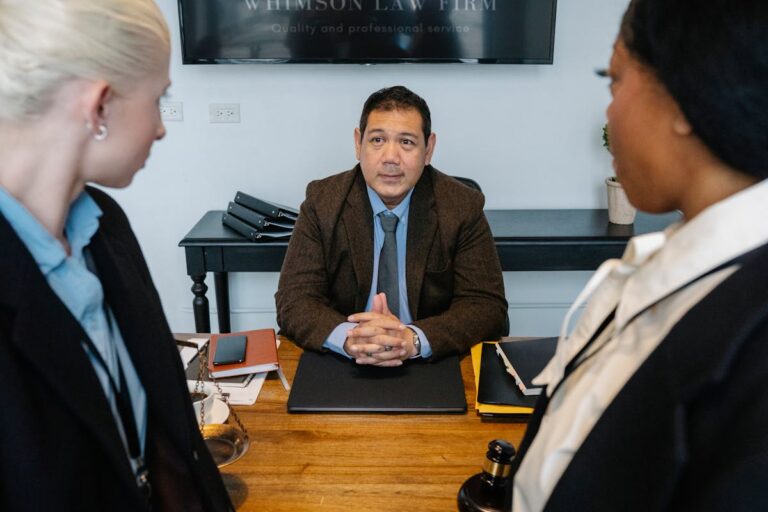The intricate dance between law and investigation is a fascinating one: the strength of a lawyer’s case can often hinge on the depth and quality of investigation that precedes it. The collaboration between investigative services and legal professionals is an underexplored domain, a dynamic partnership that wields the power to influence the trajectory of a case considerably. The subsequent discussion aims to explore how this symbiotic relationship empowers lawyers and contributes to building an unassailable legal case. The objective is to unmask the true potential of this partnership and how it shapes the law’s pursuit of justice.
Understanding Investigative Services
When we explore the domain of investigative services, it becomes clear that these services provide an essential backbone to any successful case-building endeavor. They serve as a critical catalyst, enabling case participants to unearth the truth through meticulous data collection, examination, and interpretation.
Private investigations, one of the pillars of investigative services, provide an objective lens through which various case scenarios can be viewed. These services are typically carried out by seasoned professionals who possess a unique blend of skills, including critical thinking, attention to detail, and a knack for pattern recognition. They meticulously sift through a mountain of data to identify key evidence that can make or break a case.
Furthermore, legal ethics play a significant role in guiding the conduct of these investigations. Investigators must adhere to strict ethical guidelines, ensuring that their methods do not infringe upon any individual’s rights or compromise the integrity of the evidence. They are also expected to maintain an impartial stance, conducting their investigations without allowing personal biases to cloud their judgement.
Role of Investigators in Legal Cases
The role of investigators in legal cases is multifaceted, with a core function being the gathering of essential evidence. This process involves the meticulous collection, preservation, and documentation of all physical, digital, and testimonial evidence related to a case. Additionally, investigators perform surveillance tasks and identify potential witnesses, contributing greatly to the case’s overall strength and outcome.
Gathering Essential Evidence
In any legal case, the task of gathering essential evidence is integral to building a solid foundation for arguments. This vital process, known as evidence collection, requires a meticulous approach, a keen eye for detail, and thorough knowledge of legal documentation.
Investigators play a central role in evidence collection, working in tandem with lawyers to guarantee that all pieces of evidence are accurately recorded, validated, and preserved. This includes physical evidence, digital data, and documents that can substantiate or refute claims made in court. The investigator’s role goes beyond mere collection; they also analyze and interpret the evidence, identifying patterns and anomalies that could influence the case’s direction.
Legal documentation, another vital aspect, provides a formal record of collected evidence. This not only includes the evidence itself but also details about its acquisition, custody, and handling. Proper legal documentation guarantees that the evidence remains admissible in court, preserving its integrity while protecting the rights of all parties involved.
Surveillance and Witnesses
Expanding on their responsibilities, investigators in legal cases frequently utilize surveillance and witness testimonies as essential tools in their evidence collection efforts. These methods, however, are not without their challenges and considerations, particularly concerning witness reliability and surveillance ethics.
Witness reliability can be a volatile element in a case. Witnesses may misremember events, be influenced by external factors, or be intentionally dishonest. Consequently, investigators must meticulously assess the credibility of witnesses – examining their background, checking their statements for consistency, and corroborating their accounts with other evidence. This rigorous process helps to enhance the reliability of the witness testimony and minimize the chances of wrongful convictions.
Surveillance, on the other hand, offers investigators the opportunity to gather factual, objective evidence. However, it is essential to guarantee that surveillance methods uphold ethical standards. This includes respecting privacy rights, obtaining necessary permissions, and ensuring the legality of the surveillance method employed. Investigators must strike a balance between obtaining critical information and maintaining ethical standards.
Through these practices, investigators play an important role in building a solid case, providing lawyers with reliable and ethically sourced evidence to enhance their litigation strategies.
Unearthing Evidence: A Crucial Task
With a focus on the meticulous process of investigation, unearthing evidence emerges as an essential task in building a solid case. This task goes beyond merely collecting information. It involves a detailed analysis of the available data, discerning the relevant from the irrelevant, and, ultimately, preserving the evidence to guarantee its integrity and validity during court proceedings.
Evidence preservation is a critical aspect of this process. It requires maintaining a strict chain of custody to prevent contamination or tampering. The preservation of evidence, however, is not merely a procedural necessity. It also carries significant ethical considerations. Lawyers and investigators must adhere to a high standard of professional conduct, avoiding any action that might compromise the evidence or unfairly influence its interpretation.
The task of unearthing evidence, consequently, is a complex interplay of forensic skills, analytical thinking, and ethical responsibility. It demands precision, integrity, and a thorough understanding of legal procedures. The strength of a case often hinges on the quality and credibility of its evidence, emphasizing the importance of this critical task in the investigative and legal process.
Surveillance: An Investigator’s Tool
Turning to another critical aspect of investigation, surveillance stands as an essential tool for investigators. It is often used in covert operations, enabling investigators to monitor activities, gather evidence, and draw accurate conclusions without alerting the subject.
The essence of surveillance lies in its ability to provide real-time information, often proving to be a game-changer in legal proceedings. Investigators, through systematic observation, can record patterns, behaviors, and interactions, which can help build a compelling case. In addition, surveillance can uncover facts that are otherwise challenging to obtain, delivering insights that can tilt a case in favor of the client.
However, surveillance isn’t a free-for-all. It must be conducted within the boundaries of law and ethical considerations. Investigators must respect privacy rights and avoid infringing on personal liberties. Unlawful surveillance can lead to legal repercussions and can discredit the evidence collected. Therefore, it is imperative that investigators maintain a fine balance between the pursuit of truth and respect for individual privacy.

Investigative Services and Witness Tracking
Investigative services play an essential role in building a solid case, particularly through the meticulous process of witness tracking. The importance of this practice lies in its ability to provide tangible evidence, and to corroborate or dispute claims made during the legal proceedings. To understand this better, we will scrutinize the inherent procedures within investigative services and shed light on the significance of witness tracking.
Importance of Witness Tracking
Understanding the intricate dynamics of witness tracking plays a pivotal role in investigative services. The key objective is to be able to maintain a credible chain of information that will be essential in establishing facts in legal proceedings. The process involves elaborate and meticulous tracking techniques, which guarantee that the witness can be reached when needed and that information provided remains consistent and reliable.
The credibility of a witness is often the cornerstone of many legal cases. Witness tracking guarantees that their credibility is not compromised. It aids in determining whether they are consistent in their accounts or if they are subject to external influences that may affect their testimonies. In addition, witness tracking enables investigative services to evaluate the reliability of the witness over time, strengthening the weight of their testimonies.
Tracking techniques involve systematic procedures, starting from identifying and locating the witness, to maintaining regular contact and evaluating their credibility. Advanced technology and software are now being utilized to streamline this process, guaranteeing accuracy and efficiency.
Thus, witness tracking is a critical component in investigative services, directly impacting the outcome of legal cases by guaranteeing the credibility and reliability of key witnesses.
Procedures in Investigative Services
A multitude of precise and systematic procedures underpin the field of investigative services, particularly when it comes to witness tracking. These procedures often involve a blend of traditional investigative techniques and modern technology to trace and document the movements and activities of individuals pertinent to a legal case.
Foremost among these techniques is physical surveillance, a time-tested method that involves discreetly following and observing the witness. This is complemented by digital surveillance, which leverages tools such as social media, online databases, and public records to gather information. These methods, however, are not employed indiscriminately. Ethical considerations play a significant role in shaping the scope and extent of these investigations.
Investigators adhere strictly to regulations that respect privacy rights, only gathering information that is legally and ethically permissible. They are also trained to minimize intrusion into the individual’s personal life, ensuring that the investigation does not cross into harassment or stalking. In addition, any information obtained is handled with utmost confidentiality, safeguarding the witness’s private information while providing invaluable support to the legal process.
The Power of Background Checks
An overwhelming majority of successful legal cases can attribute their victory to the strategic use of background checks. These checks provide extensive reports that detail a myriad of aspects about an individual or entity, delivering valuable insights that can be leveraged to build a solid case.
Background checks are not merely about collating personal information; they are a vital part of the risk assessment process. They enable lawyers to identify potential obstacles, forecast outcomes, and devise robust strategies. For instance, in a fraud case, a thorough background check can reveal patterns of financial inconsistencies that strengthen the case against a defendant.
Moreover, in litigations involving corporations, thorough checks can uncover hidden assets, undisclosed affiliations, or historical legal issues that could greatly impact the case. These checks also help in identifying witnesses and determining their credibility, a critical aspect of any legal proceeding.
In essence, the power of background checks lies in their ability to transform raw data into actionable intelligence. They provide lawyers with a competitive edge, offering a 360-degree view of the situation that enables them to navigate successfully through the complexities of legal battles.
Utilizing Digital Forensics in Law
In the same vein as background checks, digital forensics has emerged as another formidable tool in the legal field. This specialized area of forensics focuses on the recovery and investigation of material found in digital devices, often related to cybercrime. The advent of digital forensics has greatly expanded the landscape of legal evidence, enabling the interpretation and use of digital evidence in a wide array of cases.
The role of digital forensics in law can be broken down into four key areas:
- Data Recovery: Digital forensics can recover data that has been deleted or otherwise lost. This recovered data can serve as essential digital evidence in a case.
- Forensic Analysis: This involves the detailed examination of digital evidence to establish its source, integrity, and context within a case.
- Expert Testimony: Forensic analysts can testify in court about the methods used to collect and analyze the evidence, reinforcing its credibility.
- Incident Response: In cases of cybercrime, digital forensics can help identify the sources of attacks, providing key information for legal proceedings.
Case Study: Investigative Services in Action
Reflecting on a real-world example, let’s explore the impactful use of investigative services in the infamous Enron scandal. In this case, investigative techniques were instrumental in uncovering the complex web of deceit that led to one of the largest bankruptcies in US history.
Using a combination of financial, forensic, and digital investigations, teams worked meticulously to expose the fraudulent accounting practices that were at the heart of Enron’s downfall. This involved unraveling an intricate series of off-the-books partnerships and undisclosed conflicts of interest that enabled the energy company to hide its mounting debts.
The Enron scandal serves as a stark reminder of the importance of legal ethics. The lawyers involved faced a significant challenge in maintaining the balance between their duty to their clients and their responsibility to the justice system. In the face of such high-profile corporate corruption, they needed to navigate a complex ethical landscape, ensuring their actions were in line with professional conduct standards.
This case demonstrates the power of investigative services in supporting lawyers, by providing the rigorous evidence needed to expose corporate malfeasance and uphold justice. It underscores the need for robust investigative techniques, and the importance of adhering to legal ethics in all aspects of case management.
Frequently Asked Questions
What Are the Costs Associated With Hiring Investigative Services for Legal Cases?
The costs of hiring investigative services for legal cases vary widely, influenced by factors such as case complexity, required skill sets, and service rates, which can range from hourly fees to extensive package deals.
How Do Investigative Services Maintain Confidentiality and Client Privacy?
Investigative services maintain client confidentiality and privacy through strict adherence to data protection laws, utilizing secure systems, and prioritizing client trust through transparent communication about information handling practices and protocols.
Can Investigative Services Be Used in International Legal Cases?
Yes, investigative services can be utilized in international legal cases. Cross border investigations can aid in evidence collection and verification, thereby enhancing the case’s strength by providing thorough and objective information.
What Type of Training and Qualifications Are Required for Legal Investigators?
Legal investigators require thorough training in areas like interviewing, surveillance, and evidence collection. Typically, qualifications include a degree in Criminal Justice and investigator certifications, such as Certified Legal Investigator or Professional Certified Investigator.
What Ethical Considerations Must Investigative Services Adhere to in Their Work?
Investigative services must strictly adhere to ethical guidelines, ensuring confidentiality, integrity, and legality in their work. Professional conduct includes avoiding conflicts of interest and respecting the rights and privacy of individuals during investigations.






